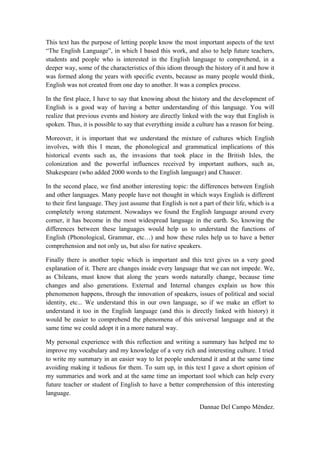
Tel reflexion
- 1. This text has the purpose of letting people know the most important aspects of the text “The English Language”, in which I based this work, and also to help future teachers, students and people who is interested in the English language to comprehend, in a deeper way, some of the characteristics of this idiom through the history of it and how it was formed along the years with specific events, because as many people would think, English was not created from one day to another. It was a complex process. In the first place, I have to say that knowing about the history and the development of English is a good way of having a better understanding of this language. You will realize that previous events and history are directly linked with the way that English is spoken. Thus, it is possible to say that everything inside a culture has a reason for being. Moreover, it is important that we understand the mixture of cultures which English involves, with this I mean, the phonological and grammatical implications of this historical events such as, the invasions that took place in the British Isles, the colonization and the powerful influences received by important authors, such as, Shakespeare (who added 2000 words to the English language) and Chaucer. In the second place, we find another interesting topic: the differences between English and other languages. Many people have not thought in which ways English is different to their first language. They just assume that English is not a part of their life, which is a completely wrong statement. Nowadays we found the English language around every corner, it has become in the most widespread language in the earth. So, knowing the differences between these languages would help us to understand the functions of English (Phonological, Grammar, etc…) and how these rules help us to have a better comprehension and not only us, but also for native speakers. Finally there is another topic which is important and this text gives us a very good explanation of it. There are changes inside every language that we can not impede. We, as Chileans, must know that along the years words naturally change, because time changes and also generations. External and Internal changes explain us how this phenomenon happens, through the innovation of speakers, issues of political and social identity, etc... We understand this in our own language, so if we make an effort to understand it too in the English language (and this is directly linked with history) it would be easier to comprehend the phenomena of this universal language and at the same time we could adopt it in a more natural way. My personal experience with this reflection and writing a summary has helped me to improve my vocabulary and my knowledge of a very rich and interesting culture. I tried to write my summary in an easier way to let people understand it and at the same time avoiding making it tedious for them. To sum up, in this text I gave a short opinion of my summaries and work and at the same time an important tool which can help every future teacher or student of English to have a better comprehension of this interesting language. Dannae Del Campo Méndez.